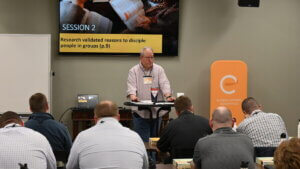It’s been more than two decades since I found myself sitting in my living room floor crying without knowing why. It was enough to make me question whether I was losing it mentally, because nothing like that had ever happened before.
After all, I was a pastor, a person of faith, someone who generally had or could find answers or at least knew what prayer to pray. At that moment, I had no answers and I felt emotionally overwhelmed and despondent, and it truly worried me.
The stress I had been experiencing in the weeks, months and few years prior to this event had apparently began to take its toll. The death of my brother. The critical illness of my father. New church appointment. Children being born. These and so many other events had slowly worn me down.
Later, I came to understand that I was experiencing chronic depression. Not feeling blue, not having a bad day, not a bad attitude, not in a funk but clinical depression connected to changes in brain chemistry and complicated by fatigue and stress.
What I further came to understand was that few men, and even fewer people in the church world, were ready to talk about depression, much less understand all there was to the subject.
I was told to “cheer up,” “have faith,” “hold on” and other equally vague and unhelpful brief little comments people would make before changing the subject.
This is when my journey and my seminary education made a slight change in direction. I still pastored, prayed, studied theology, worked in the church, was a father and a husband and tried to be a friend to others. But the new direction I took was to try to understand what I had experienced.
Today, after retiring from pastoring, I work as a licensed professional counselor in the mental health field. I believe in the Word of God and in the power of prayer. I also believe we need to understand this enemy that is taking the life from so many men and how to defeat it.
To begin with, there are so many misunderstandings that need to be addressed. For example, a person can be depressed and not ever be suicidal. Depression is not an attitude, it’s a physical ailment affecting the brain which is an organ in our body, just like the heart, lungs, kidneys, etc. One cannot “just snap out of it.” It is often genetic and runs in families.
Alcohol use or drug use can make it worse. It can greatly interfere in our ability to be in relationships and to feel like our prayers are being heard. It can also interfere with effective decision-making, just to name a few of the problems caused by depression.
The three most commonly overlooked signs of depression in men are:
- Physical pain. Sometimes depression in men shows up as physical symptoms, such as backache, frequent headaches, sleep problems, sexual dysfunction or digestive disorders that don’t respond to normal treatment.
- Anger. This could range from irritability, sensitivity to criticism, loss of your sense of humor, road rage, a short temper or even violence.
- Reckless behavior. A man suffering from depression may exhibit escapist or risky behavior such as pursuing dangerous sports, driving recklessly, or engaging in unsafe sex.
General symptoms used to diagnose depression are as follows: feeling hopeless or helpless; losing interest in one’s friends, activities or what one used to enjoy; being much more irritable or short-tempered, using alcohol or substances to relax; engaging in reckless behavior or self-medicating; feeling restless and agitated; a change in sleep or appetite; difficulty concentrating or being productive; and difficulty in controlling one’s negative thoughts.
It’s time the truth came out about depression. Real men suffer with depression every day.
The good news is that in most all cases it can be effectively treated. New treatments are being found every year and bodies are being healed, marriages are being healed, addictions are being overcome, hope is being restored!
If you or someone you know suffers with clinical depression, there is help available in many forms. Reach out today to someone and leave the darkness of depression behind.
Mark Beaird, LPC, MAC, SAP is a counseling therapist in North Alabama and has worked as a pastoral counselor and as a counselor in the secular workplace. In addition to authoring several books, Mark has been a columnist and freelance writer published in various newspapers and periodicals around the country. He and his wife Elaine have served in Christian ministry for more than 25 years and have two daughters.








 by Dogwood
by Dogwood